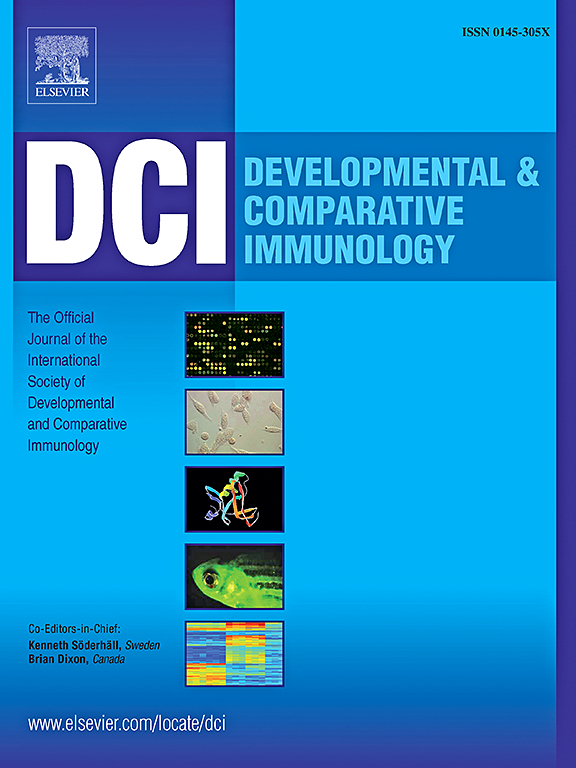Ring Finger protein 34 negatively regulates MyD88-mediated NF-κB signaling via the ubiquitin-proteasome pathway in miiuy croaker (Miichthys miiuy)
IF 2.4
3区 农林科学
Q1 FISHERIES
引用次数: 0
Abstract
Innate immunity constitutes a fundamental defense mechanism in host immunity, wherein myeloid differentiation factor 88 (MyD88) functions as the central adaptor protein in Toll-like receptor (TLR) signaling pathways, orchestrating teleost innate immune responses the nuclear factor-kappa B (NF-κB) pathway. To elucidate the regulatory mechanism of E3 ligase RNF34 (Ring Finger Protein 34) in this signaling cascade, we employed miiuy croaker (Miichthys miiuy) as a model organism and conducted a series of experiments. Luciferase reporter assays demonstrated that RNF34 exerted dose- and time-dependent inhibition on the MyD88-mediated NF-κB signaling pathway. This inhibitory effect persisted under LPS stimulation, confirming RNF34's stable regulatory function. Western blot analysis further revealed that RNF34 negatively regulated MyD88 protein expression, and this regulatory effect was significantly enhanced under LPS stimulation. Mechanistic investigations showed that cycloheximide (CHX) chase assays indicated RNF34 significantly shortened MyD88 protein half-life; treatment with the proteasome inhibitor MG132 completely reversed RNF34-mediated MyD88 degradation; and ubiquitination assays demonstrated that RNF34 substantially enhanced MyD88 ubiquitination levels. These findings collectively indicate that RNF34 promotes MyD88 ubiquitination, leading to its proteasomal degradation and inhibition of NF-κB signaling pathway activation. This study enriches the understanding of RNF34 as a negative immune regulator in miiuy croaker, providing evidence for the regulatory mechanism of the NF-κB signaling pathway in teleosts and offering insights into the precise maintenance of immune homeostasis in teleost fishes.
环指蛋白34通过泛素-蛋白酶体途径负调控myd88介导的NF-κB信号通路。
先天免疫是宿主免疫的基本防御机制,髓样分化因子88 (MyD88)作为toll样受体(TLR)信号通路的中心适配蛋白,通过核因子κB (NF-κB)通路调控硬骨鱼先天免疫应答。为了阐明E3连接酶RNF34 (Ring Finger Protein 34)在这一信号级联中的调控机制,我们以miuy croaker (Miichthys miiuy)为模型生物,进行了一系列实验。荧光素酶报告基因实验表明,RNF34对myd88介导的NF-κ b信号通路具有剂量依赖性和时间依赖性的抑制作用。这种抑制作用在LPS刺激下持续存在,证实了RNF34具有稳定的调控功能。Western blot分析进一步发现,RNF34负向调控MyD88蛋白的表达,且这种调控作用在LPS刺激下显著增强。机制研究表明,环己亚胺(CHX)追踪实验表明,RNF34显著缩短了MyD88蛋白的半衰期;用蛋白酶体抑制剂MG132完全逆转rnf34介导的MyD88降解;和泛素化实验表明,RNF34显著提高了MyD88的泛素化水平。这些发现共同表明,RNF34促进MyD88泛素化,导致其蛋白酶体降解并随后抑制NF-κB信号通路的激活。本研究丰富了对硬骨鱼RNF34作为负性免疫调节因子的认识,为硬骨鱼NF-κB信号通路的调控机制提供了证据,为硬骨鱼免疫稳态的精确维持提供了新的思路。
本文章由计算机程序翻译,如有差异,请以英文原文为准。
求助全文
约1分钟内获得全文
求助全文
来源期刊
CiteScore
6.20
自引率
6.90%
发文量
206
审稿时长
49 days
期刊介绍:
Developmental and Comparative Immunology (DCI) is an international journal that publishes articles describing original research in all areas of immunology, including comparative aspects of immunity and the evolution and development of the immune system. Manuscripts describing studies of immune systems in both vertebrates and invertebrates are welcome. All levels of immunological investigations are appropriate: organismal, cellular, biochemical and molecular genetics, extending to such fields as aging of the immune system, interaction between the immune and neuroendocrine system and intestinal immunity.

 求助内容:
求助内容: 应助结果提醒方式:
应助结果提醒方式:


